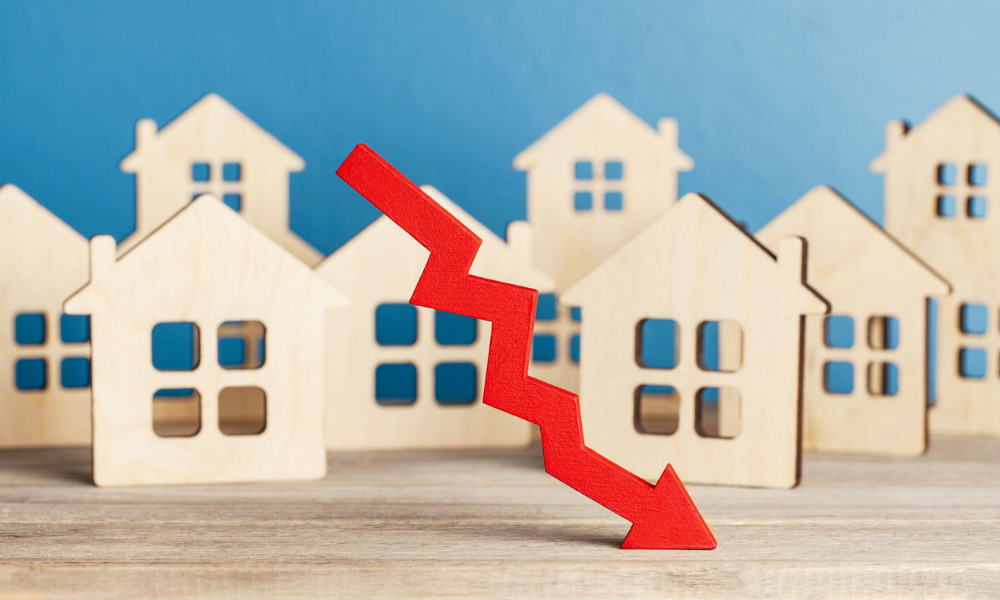Some stability seen in forward-looking indicators

Indicators on demand, sales, new listings, and house prices were all negative in March, reflecting a generally weak residential market backdrop, the Royal Institution of Chartered Surveyors (RICS) has reported.
The latest RICS UK Residential Survey also found that near-term expectations suggest this pattern will remain in place for a while longer amid the tighter lending environment.
There is a glimmer of hope for the market though, as the 12-month view on sales volumes has improved in the March 2023 survey, with respondents anticipating a more stable trend emerging.
For new buyer enquiries, a headline net balance of -29% of contributors reported a fall in demand during March, which barely changed from the -30% last month.
In terms of agreed sales, the national net balance slipped to -31% this month, down from a figure of -25% for February, though this was still less negative than the recent low of -43% reported in October 2022.
RICS said that near-term expectations point to sales remaining under pressure over the next few months, returning a net balance of -29%, though this is less downcast than the reading of -45% posted in February.
At the 12-month time horizon, the net balance for sales expectations came in at +1%, representing the first time this measure has been out of negative territory since March 2022.
Meanwhile, the volume of new listings coming on to the market fell slightly during March, according to a net balance of -6% of respondents, as against the -4% previously.
Likewise, the number of appraisals undertaken over the month continues to run below the level seen during the same period last year, with the net balance for this indicator sitting at -20%.
“The overall tone of the feedback received from respondents to the latest RICS Residential Market Survey is still one of caution towards the sales market, which is reflected in both the headline price and activity indicators,” Simon Rubinsohn, chief economist at the Royal Institution of Chartered Surveyors, commented.
“Deals are being done, but a theme coming through in the anecdotal remarks is the need for vendors to recognise the shift in market dynamics. Significantly, there is also a sense that the medium-term outlook is looking a little more settled, helped by the perception that the interest rate cycle may be near the peak.
House prices on a downward trend
RICS also reported that house prices continue to go down, as evidenced by a headline net balance of -43% of respondents reporting a decline in the latest results.
Although this remains consistent with a clear downward trend in prices, the latest reading is marginally less negative than the figure of -47% seen in the previous iteration of the survey – breaking a streak of 10 consecutive months in which this indicator had slumped between April 2022 and February 2023.
Regionally, the most significant declines in prices were reported across East Anglia, the South East, the West Midlands, and London.
Going forward, near-term price expectations remain downbeat, returning a net balance reading of -49% compared to -53% last month. Regarding the outlook over the next 12 months, a net balance of -24% of survey participants foresees a further decline in prices over the year ahead.
However, 12-month price expectations are now broadly flat in London, while contributors based in Northern Ireland, Scotland and Wales predict a rise in house prices over this timeframe.
Tenant demand continues to push rents up
In the lettings market, the survey’s tenant demand growth indicator reached a five-month high, posting a net balance of +46%.
RICS said that strong tenant demand is being seen pretty much across the country, while at the same time, the landlord instructions metric remains mired in negative territory, returning a net balance of -21% in March.
Because of this demand-supply imbalance, respondents continue to anticipate rents being pushed higher, with the net balance for near-term rent expectations rising to +59% from +45%. For the year ahead, contributors are forecasting roughly a 4% growth in rental prices at the national level, with all parts of the UK expected to see an increase in rents during the coming 12 months.
“Meanwhile, the rental market remains hugely constrained by the lack of stock,” Rubinsohn noted. “Indeed, the consistency of the message from contributors to the survey about the shortfall of properties to rent and the impact this is having on rent levels is striking. The shifting tax and regulatory environment are highlighted as impacting the viability of many landlords operating in the sector.”
Want to be regularly updated with mortgage news and features? Get exclusive interviews, breaking news, and industry events in your inbox – subscribe to our FREE daily newsletter. You can also follow us on Facebook, Twitter, and LinkedIn.



